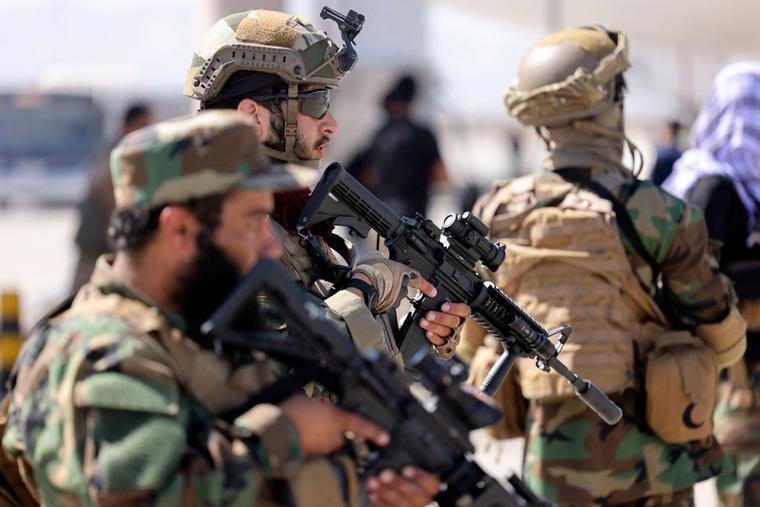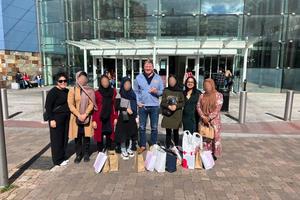Trapped by the Taliban, Praying for Escape From Afghanistan
Afghans and Afghan-Americans have found themselves caught up in a national catastrophe due to the U.S. withdrawal of military and civilian contractors that led to the Taliban’s takeover.

KABUL, Afghanistan — For two decades, Sher Shah had worked alongside U.S. personnel and Afghans to build a democratic country free from the Taliban and war. He had established a new life with his family in the U.S. with the help of Catholic Charities and a Catholic sponsor family, but briefly returned to Afghanistan this summer to attend his father’s funeral.
Now, he’s a man trying to escape the Taliban and get back home to the United States.
On Aug. 15, Sher Shah (a pseudonym due to safety concerns) went to the barber for a haircut and shave. His mother sent him a desperate message telling him that the Taliban was at the gates of Kabul. By the time he emerged, the government had fled, and the city had fallen — without a single shot fired.
“We saw people with turbans, just wild, enter Kabul city,” he said, speaking to the Register from Kabul. “The security left their posts without engaging. They just left their posts.”
“It’s unbelievable. Everybody is in shock,” he said.
Sher Shah told the Register he changes location frequently. The Taliban is inflicting reprisals, he said, going from house to house at night. Among his friends, one woman barely escaped from her house while the Taliban shot her brother dead on the couch.
“The only thing that scares me is they know me, and I’ve been all over Afghanistan,” he said.
Sher Shah was born during Afghanistan’s civil wars. The last time Afghanistan knew peace was the “Shah time,” when Afghanistan’s kings ruled until they were overthrown in 1973. Back then, the country had freedom of movement and was modernizing — but it had a dysfunctional economy. The country has never been at peace since.
“I grew up with war, I was raised with war, and my kids were raised in the war,” he said.
Sher Shah missed precious moments in his children’s lives so that he could work to give them an Afghanistan he never got to grow up in.
“I missed all those moments — just to build this country. And now it’s destroyed again.”
Sher Shah said he is deeply grateful for the support of the Church, Catholic Charities, his Catholic sponsor family and their parish.
“They’re looking after them,” he said of the Catholic care his family is receiving. He said the prayers of the Church, family and friends “mean a lot to us.”
Can’t Work, Can’t Go Outside
The Taliban’s return to power has paralyzed Afghanistan in many ways. Many men fear reprisals for having worked with U.S. companies. Reports have emerged of the Taliban violating its own general amnesty and going from house to house looking for men on their kill list.
Mariam (a pseudonym due to safety concerns) told the Register that Taliban soldiers knocked on the door of her parents’ home in Kabul. Her father and brother, however, were out painting a house.
“My mother said they weren’t here,” Mariam said, speaking through a family member who translated. She said the Taliban then mercilessly beat her mother and sister-in-law and her little brother. Photos provided to the Register show both women badly bruised on their faces, while the younger brother’s face was badly smashed and his hand split open.
Mariam broke down, sobbing, conveying the news, “because everybody got hurt.”
Her brother worked at a U.S. construction firm for $200 per month, and her father was a cook for a different company. But now, the men cannot work, and the family has no means to put food on the table.
Mariam’s brother and father are now hiding — moving from basement to basement — as the family hopes against hope to get them out.
“They can’t go out anywhere because it’s not safe,” Mariam said. “The only people who can work can’t go outside now,” she said.
“I just want my family in a safe place,” she added. “Not Afghanistan. No one there is safe.”
‘How Could This Happen?’
Mariam was incredulous that the Taliban would be ruling Afghanistan again.
“No one really knew the Taliban was going to come and just take over Afghanistan,” she said.
But the Taliban’s takeover of Afghanistan did not surprise Naweed Yousufi, an Afghan-American journalist. Yousufi spent a decade working with the U.S. Army until terrorists nearly made good on a death threat in 2015, and he was evacuated to the U.S. on a Special Immigrant Visa. He lives in California.
Yousufi, who hosts his Kabul to Sacramento Show, told the Register that Afghanistan’s downfall came from its own internal “nationalism, [ethnic] jealousy and racism.”
Yousufi said Afghan national pride subverted efforts to tell the truth about the government’s corruption and their failures and also saw government leaders insist on Afghanistan’s independence when they needed help from the U.S. Afghanistan has more than 14 ethnic groups — the largest being the Pashtun — and more than 100 that jockey for power.
Yousufi said he was denounced by Afghans and government officials for his reports that the Taliban was advancing and that the Afghan Army’s reported number of 300,000 soldiers existed only on paper. The Afghan national army’s real strength, Yousufi said, was closer to 190,000.
In any event, the U.S. total withdrawal left Afghanistan’s armed forces without 16,000 civilian contractors to service their aircraft, effectively gutting their military’s “combined arms” military doctrine as 75,000 Taliban infantry made their advance.
Yousufi said the Taliban also had the benefit of support from Pakistan’s Inter-Services Intelligence (ISI) who provided direct payments to provincial governors when the U.S. government stopped direct payments and directed the governors to go through the Afghan central government.
The Taliban, he said, is now benefiting its patrons, as well as Russia and China, who were happy to see the U.S. presence end in the region. Yousufi said the Taliban has delivered both Humvees and Blackhawk helicopters to Iran, which is eager to learn from or copy the technology. The Taliban and China are in discussions about how to incorporate Afghanistan into China’s One Belt trade infrastructure meant to recapture the old Silk Road and reassert China’s global economic dominance.
Yousufi said the complete U.S. withdrawal violated an understanding the Afghans had that the U.S. would stay long enough to allow a new generation of Afghans to take leadership of the country. But the U.S. withdrawal came before that generation fully came of age.
“A lot of Afghans hate America now because they left,” Yousufi said.
In the weeks following the capture of Kabul, Afghan forces loyal to the previous government made their last stand in Panjshir against the Taliban. Yousufi hoped the U.S. would support them as a redoubt for the democratic government to retake Afghanistan. But unlike the Kurdish fight against ISIS, no U.S. Air Force came to their assistance. Instead, a Taliban force armed with U.S. equipment took control of the mountain stronghold and began starving the population and carrying out revenge killings.
Yousufi said he expects Afghanistan will now return to being a haven for terrorists.
“We may have a second Somalia in Afghanistan,” Yousufi said.
What pains him is the U.S. expresses “condolences and sympathies” for a situation caused by the U.S. withdrawal, but Afghans will suffer from U.S. airstrikes “after the first bombing.” Multiple news agencies have now reported the Biden administration sent a Reaper drone to avenge the Kabul airport bombing that killed 13 U.S. military members and more than 100 Afghans. However, the drone is alleged to have killed an Afghan humanitarian aid worker and most of his children, who had been hoping themselves to escape Afghanistan.
Hundreds or Thousands Left in Afghanistan?
U.S. Secretary of State Anthony Blinken has stated approximately 100 U.S. citizens and lawful permanent residents remain in Afghanistan.
“We are working around the clock to help U.S. citizens, to help lawful permanent residents, to help at-risk Afghans to whom we have a special commitment depart Afghanistan if they so choose,” Blinken said in Doha, Qatar, on Sept. 7. “And we’ve successfully done that already, and we’re in continuous contact with American citizens who remain in Afghanistan.”
But Sher Shah said he has heard nothing from the State Department since Aug. 26 — and he made use of the State Department’s information posted on its website for U.S. citizens and lawful permanent residents stuck in Afghanistan.
“There are thousands of Americans still in Afghanistan,” he said. “And I’m one of them.”
Sher Shah said many American citizens and green-card holders caught in Afghanistan had their identities stolen by Afghan government linguists and special forces that sold them to Afghans willing to pay $2,000 to $6,000 to get out of the country.
Yousufi said 149 families with gate passes arrived, only to be turned back, because their spot on the plane had been given to someone else.
“They’re stuck in Kabul, but the same people arrived in Virginia?” he said. “That’s not possible.”
Yousufi said UNHCR, the U.N.’s refugee agency, should take action to evacuate people. Yousufi’s message to the U.S. is: “Just save the people you left behind.”
Sher Shah keeps sending emails to the U.S. State Department, trying to find a way out of Afghanistan for himself and vulnerable family members. At night, unable to sleep, Sher Shah told the Register he keeps thinking, “How, why did it happen?”
“We sacrificed a lot. I lost my friends, my good friends — people from the U.S. and Afghanistan,” he said.
“Now everything’s gone in 20 years — gone.”
- Keywords:
- afghanistan
- taliban
- 9-11
- withdrawal

















